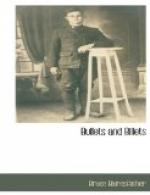A foaming pause on the brink of the abyss. Dick Turpin wins the argument, and after a few prancing circles described in the field manages to cross the bridge with his fiery steed. I then rode down the road into the little village. The village school had been turned into a battalion stores, and the quartermaster-sergeant was invariably to be found there. I dismounted and pulled my horse up a couple of steps into the large schoolroom. Tied him up here, and last saw him blowing clouds of steam out of his nose on to one of those maps which show interesting forms of vegetable life with their Latin names underneath. Now for the Colonel. I clattered off down the street to his temporary orderly room. Thank heaven, he was in! I explained the case to him. He said he would do his best, and there and then sent off a wire. I could do no more now, so after fixing up that a message should be sent me, I slowly retraced my steps to the school, extracted the horse, and wended my way slowly back to the Transport Farm. Here I languished for the rest of the day, feeling convinced that “all leave was cancelled.” I sat down to do some sketching after tea, full of marmalade and depression. About 6 p.m. I chucked it, and went and sat by the stove, smoking a pipe. Suddenly the door opened and a bicycle orderly came in: “There’s a note from the Adjutant for you, sir.”
I tore it open. “Your leave granted; you leave to-morrow. If you call here in the morning, I’ll give you your pass.”
LEAVE!!
CHAPTER XX
THAT LEAVE TRAIN—MY OLD PAL—LONDON
AND HOME—THE CALL OF THE WILD
One wants to have been at the front, in the nasty parts, to appreciate fully what getting seven days’ leave feels like. We used to have to be out at the front for three consecutive months before being entitled to this privilege. I had passed this necessary apprenticeship, and now had actually got my leave.
[Illustration: Leave!!!]
The morning after getting my instructions I rose early, and packed the few things I was going to take with me. Very few things they were, too. Only a pack and a haversack, and both contained nothing but souvenirs. I decided to go to the station via the orderly room, so that I could do both in one journey. I had about two miles to go from my billets to the orderly room in the village, and about a mile on from there to the station. Some one suggested my riding—no fear; I was running no risks now. I started off early with my servant. We took it in shifts with my heavy bags of souvenirs. One package (the pack) had four “Little Willie” cases inside, in other words, the cast-iron shell cases for the German equivalent of our 18-pounders. The haversack was filled with aluminium fuse tops and one large piece of a “Jack Johnson” shell case. My pockets—and I had a good number, as I was wearing my greatcoat—were filled with a variety of objects. A pair of little clogs found in a roof at St. Yvon, several clips of German bullets removed from equipment found on Christmas Day, and a collection of bullets which I had picked out with my pocket knife from the walls of our house in St. Yvon. The only additional luggage to this inventory I have given was my usual copious supply of Gold Flake cigarettes, of which, during my life in France, I must have consumed several army corps.




